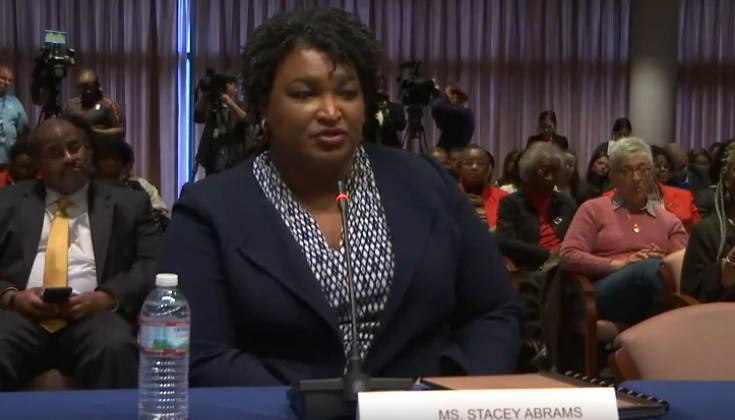
Honest, paywall-free news is rare. Please support our boldly independent journalism with a donation of any size.
Congressional leaders have begun a series of listening sessions and field hearings that seek to document the need for the full restoration of the Voting Rights Act of 1965. The U.S. Supreme Court gutted the VRA in its 2013 ruling in the Shelby County v. Holder case out of Alabama that ended federal preclearance of election changes in places with a history of voter discrimination, most of them in the South.
The gatherings are being organized by the House Administration Committee’s Subcommittee on Elections, which had been eliminated by Republicans but was restored after Democrats won control of the chamber last fall; the subcommittee is chaired by Rep. Marcia Fudge of Ohio. The initial listening session took place on Feb. 4 in Brownsville, Texas, while the first formal field hearing occurred in Atlanta on Feb. 19 at the Carter Presidential Center. The next hearing is set for the small town of Halifax, North Carolina, on April 18.
The Atlanta hearing featured testimonies from representatives of voting rights groups including the Advancement Project and Black Voters Matter. They detailed the long lines, defective voting machines, and voter purges that Georgia voters faced during the 2018 midterm. That election was overseen by Republican Brian Kemp, the Georgia secretary of state who was also running for governor and won amid controversy over his efforts to purge voter registrations in a way that disproportionately affected black residents.
Among those who testified in Atlanta was Stacey Abrams, a voting rights advocate and former Georgia state representative who ran for governor against Kemp as a Democrat, losing by a narrow margin of 50.2 to 48.8 percent. “From issues with registration to ballot access to the counting of votes,” she said, “Georgians faced a systemic breakdown of its electoral process.”
Also testifying was Stacey Hopkins, a Fulton County resident who described her experience with a method of voter suppression known as the “postcard trick.” In 2017, Hopkins was one of almost 50,000 Fulton County voters who received a notification from the local Board of Registration and Elections that warned her to confirm her voting address or else be placed on an inactive voter list. But under Georgia state law, registered voters who inform the U.S. Postal Service that they have moved within the same county — as Hopkins did — must have their voter registration information automatically updated without requiring any further action by the voter.
Witnesses noted that with the Shelby decision ending preclearance from the U.S. Department of Justice, state lawmakers around the country — and especially in the Southern states — were able to implement discriminatory changes in redistricting, early voting, and the number of polling places. Of the 13 Southern states, 11 adopted restrictive new voting laws in Shelby’s wake. Sean Young, legal director of the ACLU of Georgia, emphasized the importance of restoring the protections of the VRA.
“We desperately need preclearance in the South,” he testified.
Congress has attempted to restore the VRA’s preclearance provision through legislation. In 2014, Rep. Jim Sensenbrenner, a Wisconsin Republican, introduced the Voting Rights Amendment Act, and the following year Rep. Terri Sewell, an Alabama Democrat, introduced the Voting Rights Advancement Act, a more far-reaching proposal than the Sensenbrenner bill. But because of inaction from Republican leaders, both bills have been stalled in the legislative process. (The day after this story was published, Sewell introduced her bill into the new Congress, saying that it aims “to stop the most egregious forms of recent voter suppression.”)
Since the Democrats took control of the House last November, the efforts to restore the VRA have continued. The first bill introduced in the current Congress was the For the People Act (H.R.1), a broad political reform bill sponsored by Rep. John Sarbanes of Maryland. Among other things, H.R.1 declares a commitment to restore the VRA’s preclearance provision.
The hearings and listening sessions will enable Congress to document ongoing racial discrimination in voting and determine what kind of VRA restoration legislation is needed to address the problem. Halifax County, North Carolina, where the next hearing will take place, is a rural, poor, majority-black county that had to shut down two of its three early voting sites due to a new state law that required such sites to stay open for 12 hours per day. Other hearings are planned for later this year in Alabama, Florida, North Dakota, Ohio, and Washington, D.C. though no dates have been set yet.
“The record we compile will prove beyond a shadow of a doubt that we still need the Voting Rights Act,” Fudge said.
Press freedom is under attack
As Trump cracks down on political speech, independent media is increasingly necessary.
Truthout produces reporting you won’t see in the mainstream: journalism from the frontlines of global conflict, interviews with grassroots movement leaders, high-quality legal analysis and more.
Our work is possible thanks to reader support. Help Truthout catalyze change and social justice — make a tax-deductible monthly or one-time donation today.